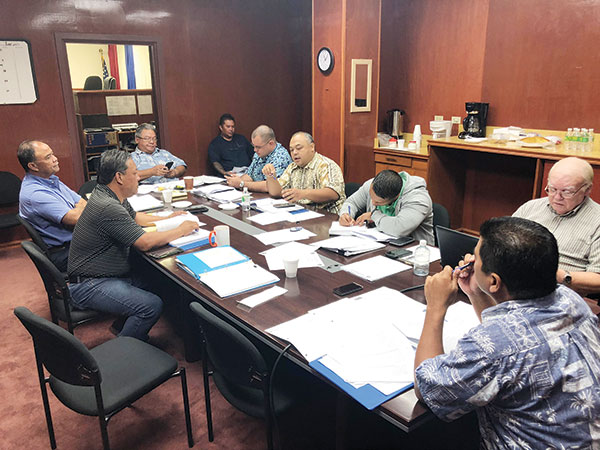Weed scuffle: Are penalties considered revenue?
JGO has yet to adopt bill for passage despite many amendments

The House Committee on Judiciary and Governmental Operations confer yesterday at the House speaker’s conference room on Capitol Hill to amend the Senate bill that legalizes the recreational and medicinal consumption of cannabis and creates the cannabis commission. (Erwin Encinares)
A House of Representatives lawmaker clashed yesterday with the chamber’s legal counsel on whether revenue generation includes penalties provided in the cannabis bill.
Led by Rep. Ivan A. Blanco (R-Saipan), the House Judiciary and Governmental Operations Committee discussed several omissions in the bill, including what they believe were revenue-generating provisions pertaining to fees and taxation in Senate Bill 20-62.
The bill, offered by Sen. Sixto K. Igisomar (R-Saipan), legalizes the recreational and medicinal use of cannabis and creates the cannabis commission.
During yesterday’s meeting, Rep. Blas “BJ” Jonathan Attao (Ind-Saipan) questioned why the penalties for driving under the influence of cannabis were not omitted from the bill while fees and taxations pertaining to cannabis consumables were.
House legal counsel John Cool replied that the penalties were more of a deterrence rather than a revenue-generating provision.
Cool added that the intent of the bill is to regulate and legalize the recreational and medicinal use of cannabis—not to generate revenue. He said if the latter were the case, then the penalties imposed in the bill could be considered revenue-generating.
However, Attao argued that monies obtained in any form is technically revenue, therefore encompassing penalties and fines under the constitutional functions of the House of Representatives. He reiterated that the CNMI Constitution only allows revenue-generating legislation to come from the House.
Blanco then requested for Cool to submit his written opinion stating that penalties in bills are not considered revenue and may originate from the Senate. Cool agreed, and would be submitting it at the next JGO meeting, which would be on July 2, 2018, 9:30am.
Compromising amendments
According to Blanco, the amendments were compromises after seeking comments from the Executive Branch, the Public School System, and other government agencies pertaining to the legalization of cannabis.
To satisfy a compromise with PSS, the committee omitted a section in the bill that protects employees from discrimination based on their consumption of cannabis and its other edible forms.
Committee member and minority leader Rep. Edmund Villagomez (Ind-Saipan) supported removing this section of the bill. He added that the bill’s intent is merely to legalize cannabis and that the bill does not change existing policies within public and private agencies.
PSS has a policy that immediately terminates employees if they test positive in a drug test. Their initial request, according to Blanco, was to exempt PSS management and the Board of Education from this provision, but the committee decided to omit it entirely.
The committee also made several compromises with the Executive Branch, such as shortening the timeframe for Gov. Ralph DLG Torres to appoint members to the cannabis commission. The committee changed the 90-day timeframe for the selection of the commissioners to only 30 days, as requested by Torres, said Blanco, to which committee member Rep. Frank Aguon (R-Saipan) thinks is “proper.”
Applicable to all of the NMI
The committee further amended the bill to only be applicable on Saipan. The amendment initially offered by Blanco was to only legalize cannabis on Saipan. If Rota and Tinian wish to legalize cannabis as well, it would have to be adopted through legislation introduced through their respective delegations. Committee member Rep. Edwin Aldan (R-Tinian) thought the amendment sidesteps Rota and Tinian from the bill by requiring additional legislative processes for both islands. Ultimately, the committee agreed to omit the section of the bill entirely and make it applicable to the Commonwealth as a whole rather than per senatorial district.
The committee saw fit that residents of the CNMI should benefit from the legalization of cannabis, which is believed to jumpstart a new industry in the region.
S.B. 20-62 was tweaked to include amendments to reflect that only licensees with “long-term permanent interests in the licensed premises” shall be granted licenses to produce, process, and sell cannabis and its forms in the CNMI. This includes those who have private land leases and public land leases.
Commissioner, executive director qualifications
The committee added amendments that allowed commissioners and executive directors with criminal records older than 15 years in any jurisdiction of the United States, the Commonwealth, or any foreign country—except for traffic offenses—to be appointed as a commissioner or hired by the cannabis commission as an executive director.
There shall be five Saipan commissioners and two commissioners for Rota and Tinian, bringing the total number of commissioners to nine. The bill specifies that the commissioners should have at least a bachelor’s degree in any postsecondary educational institution accredited in the U.S. or at least five years work experience in business management, government management, or financial management.
Executive director qualifications are the same as those of a commissioner’s.
Due Diligence
Blanco said after the three-hour discussion on the bill that, although it was the intention of the committee to get the bill moving, the bill had to be further polished.
“…[We] had to get the right language in there within the bound of the law. If there are concerns raised by members, we like to entertain them,” Blanco told Saipan Tribune.
“…Because we entertained comments from PSS, board and directors, the Executive Branch, and the public, this is a compromise draft. We are not yet done,” he added.
MD: Weed bill massive amendment
KW: cannabis, Sen. Sixto Igisomar, Rep. Ivan Blanco, Rep. Edwin Aldan, Rep. Edmund Villagomez, Rep. Blas “BJ” Jonathan Attao, John Cool



























